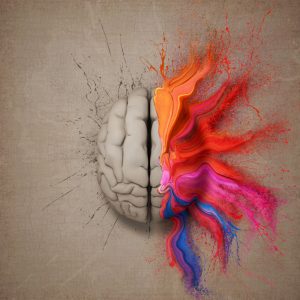
Constant high levels of cortisol caused by stress, lack of sleep, trauma, and poor nutrition all create a breeding ground for an inflammatory response on brain cells and the immune system. When the immune system in continuously engaged, the body’s reaction is a physical illness. You can see everywhere as cases of depression, PTSD, and anxiety continue to climb. This should not be our new norm or baseline for humanity.
Edward Bullmore, British neuroscience expert, Professor of Psychiatry at the University of Cambridge, and author of The Inflamed Mind: A Radical New Approach to Depression explains that, “ Your body’s state of inflammation, your immune system’s level of threat arousal, can have a direct effect on how you feel and what you think about. Inflammation of the body can cause changes in how the brain works, which in turn causes the changes in mood, cognition, and behavior that we recognize as depression.” Simply put it knocks your concentration and focus.
Doctors are trained in discovery and investigating scans and lab results. The pharmaceutical approach is tackling the SSRIs (selective serotonin reuptake inhibitors or antidepressants that adjust serotonin). One of the biggest agents of disrupting serotonin levels in the brain is blue-light, digital technology. Not blue the color, but blue the frequency from iPads, TV, computers, phones, etc. We receive low levels of blue light/frequency from the sun, which helps to regulate our circadian rhythm, alertness, and reaction times. As the sun sets, the decreasing levels of blue light trigger the release of melatonin, our natural sleep hormone. This exposure to blue light, combined with the effects of the hormones serotonin, melatonin and cortisol, helps regulate your sleep patterns and maintain good health.
A majority of research cases show the direct evidence of blue light suppresses melatonin, which increases cancer risk, heart disease, and obesity. It is tricking the brain to remain and stay awake, and ultimately shifts the circadian rhythms resulting in increased blood sugar levels and decreased leptin signals. Increased blood sugar levels cause energy fluctuations (sluggishness/fatigue) and over time can lead to insulin resistance (diabetes) and leptin is the hormone that signals satiety. If decreased, there are fewer signals to tell us to stop eating.
Now as humans, we are not resting at the proper times. We are eating meals at the improper time thus creating more disruption towards our sleep patterns and digestive tracks. Poor nutrition, lack of sleep, low hydration – all of it sparks inflammation (the biomarker/kickstarter) to cognitive depletion in the form of depression, anxiety, panic attacks, and more.
“Research shows that inflammation can precede depression, further indicating potential causality. If depression is resolved with new thinking patterns, the thesis is that depressed people need to change the way they think in order to find healing,” says Bullmore. “The fact that we are the cause of this is, paradoxically, good news since it hands back to us the potential to change our behavior and reclaim the brain function and cognitive health that’s been disrupted by our digitally enhanced lives.”
Put simply, better concentration will make life easier, less stressful, and more productive. To make this change means reflecting on what we do daily to sabotage personal concentration, and then integrate steps towards reversing habits and creating behavioral change that will improve our chances of concentrating better. This means deliberately reducing distractions and being more self-disciplined about your digital screen time, sleep hygiene, and nutrition quantity and quality, which are increasingly urgent for the sake of our cognitive and mental health.
To learn more about, Why Depression Isn’t All in the Mind, click here.
Book source: Edward Bullmore, The Inflamed Mind.
NIH: https://www.ncbi.nlm.nih.gov/pmc/articles/PMC5299389/
Blue Screen: https://thriveglobal.com/stories/what-blue-light-does-to-the-brain/
Don’t have PayPal? You can simply choose to use any one of your other credit or debit cards at the point of the PayPal checkout.